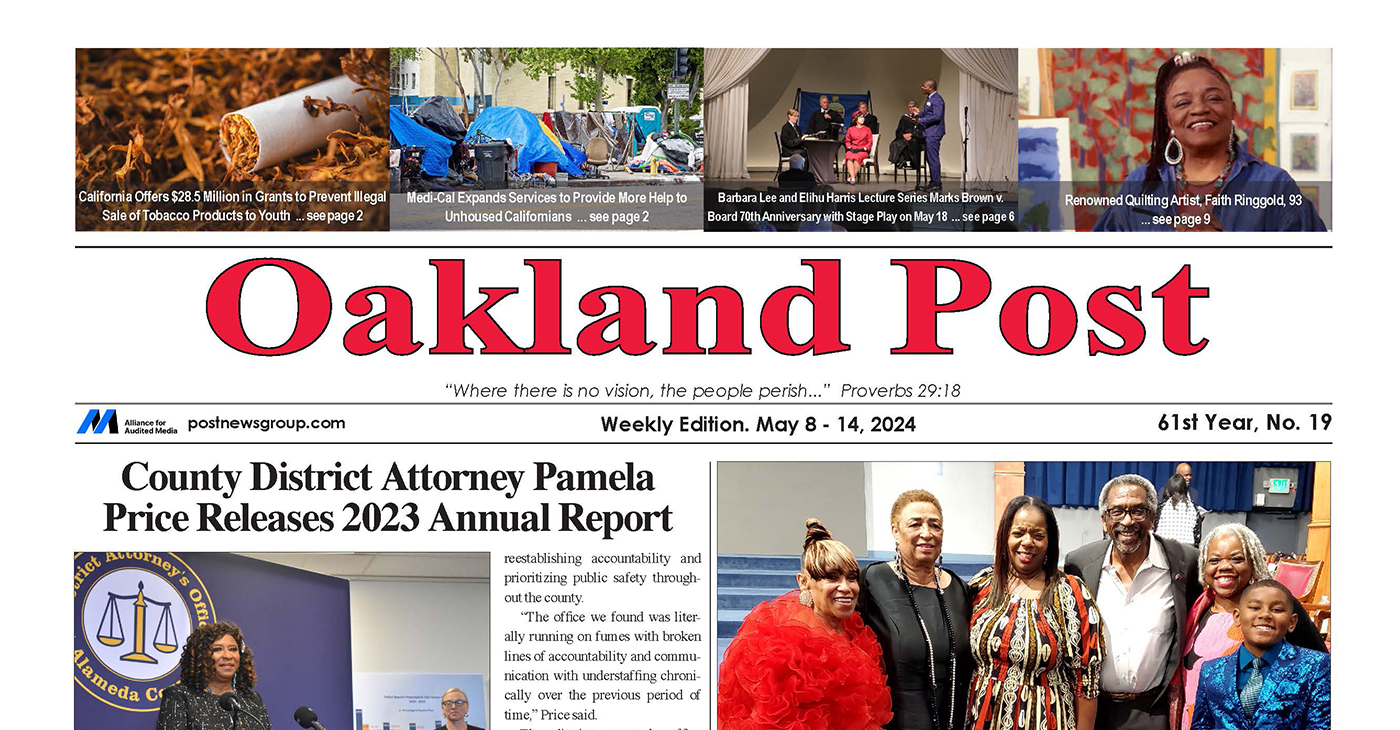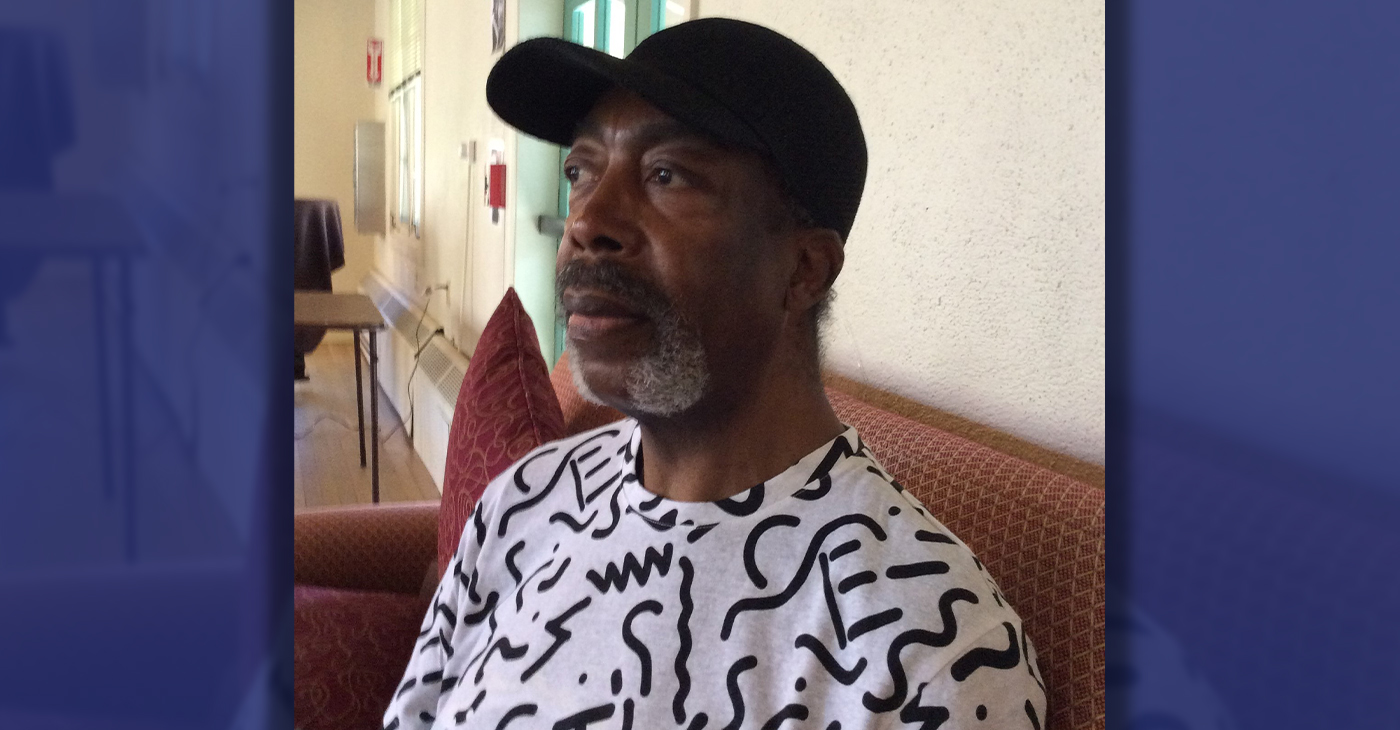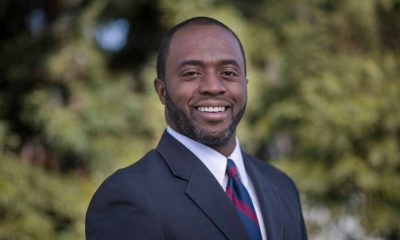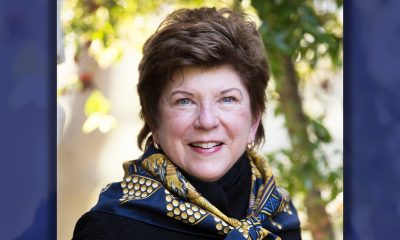Business
California Haircare Heiress Cheryl Morrow Leads Fight to Defend Industry Against Tort Lawsuit
Black hair care industry manufacturers are rallying to defend their products against “attacks” from customers, scientists and federal government officials who claim they are harmful. The companies are being accused of producing relaxers with potentially toxic ingredients that may cause cancer. On the frontlines of that defense in the Golden State is California Curl heiress Cheryl Morrow, who is also publisher of the San Diego Monitor News.

By Edward Henderson, California Black Media
Black hair care industry manufacturers are rallying to defend their products against “attacks” from customers, scientists and federal government officials who claim they are harmful. The companies are being accused of producing relaxers with potentially toxic ingredients that may cause cancer.
On the frontlines of that defense in the Golden State is California Curl heiress Cheryl Morrow, who is also publisher of the San Diego Monitor News.
Morrow, daughter of the late Dr. Willie Morrow who invented and popularized the “California Curl,” also known as the “Jheri Curl” or “Jerry Curl,” has been vocal about debunking the cancer claims as misleading. She also highlights the pioneering spirit and innovation that led to the creation of products for Black hair care by Black companies before mainstream companies entered the businesses.
“In 2022, you come out with a study with an inconclusive correlation that all of a sudden subjugates a Black legacy of hair care manufacturing to be vilified, demonized, criminalized and connected to cancer,” Morrow told California Black Media.
That same year, civil rights attorney Benjamin Crump filed a mass tort lawsuit on behalf of Jenny Mitchell, a Black woman who he claims contracted uterine cancer after her use of chemical hair straightening products sold by L’Oréal USA. Crump is suing that company as well as entities that assisted in the development, marketing, and sale of the products including Motions, Dark & Lovely, Olive Oil Relaxer, and Organic Root Stimulator.
In August 2018, Mitchell – who says she has no family history of uterine or other cancer – was diagnosed with the disease and underwent a full hysterectomy.
According to the study, published by Journal of the National Cancer Institute, also known as the “Sister Study,” frequent users of chemical hair straightening products, defined in the study as more than four uses a year, were more than twice as likely to develop uterine cancer than those who didn’t use those products.
“Black women have long been the victims of dangerous products specifically marketed to them,” said Crump in a press release. “Black women have been told they have to use these products to meet society’s standards.”
Morrow hosts events in the community and online to educate the public about Black hair care products.
“All of that is not by accident,” Morrow insists. “In creating relaxer advocates, my goal is not to protect one brand or manufacturer over another. My goal is to tell the truth, make sure the consumer is informed, to make sure that the industry in relaxing gets innovated.”
As part of her efforts, Morrow hosted an event in San in December titled “Take Your Hands Off Our Legacy.” It showcased Black hair professionals and technicians who educated consumers about the legacies of pioneers like Annie Malone, S.B. Fuller, Marjorie Stewart-Joyner, Joe Dudley, and Dr. Willie L. Morrow.
“They have the language in the lawsuit that the manufacturers did not and should have known that the relaxer was dangerous. My response to them is that they should’ve known that, actually, Black people have made their products safer and have been doing that since 2007. Dr. Morrow already did it with California Cream.”
Court records show that about 75 cases have been filed in the mass tort lawsuit, which was formed at the beginning of February 2023.
Activism
Oakland Post: Week of May 8 – 14, 2024
The printed Weekly Edition of the Oakland Post: Week of May May 8 – 14, 2024

To enlarge your view of this issue, use the slider, magnifying glass icon or full page icon in the lower right corner of the browser window. ![]()
Bay Area
Mayor Breed Proposes Waiving City Fees for Night Markets, Block Parties, Farmers’ Markets, Other Outdoor Community Events
Mayor London N. Breed introduced legislation on April 26 to encourage and expand outdoor community events. The first will waive City fees for certain events, making them less costly to produce. The second will simplify the health permitting for special event food vendors through the creation of an annual permit. Both pieces of legislation are part of the Mayor’s broader initiative to bring vibrancy and entertainment to San Francisco’s public right of ways and spaces.

Mayor’s Press Office
Mayor London N. Breed introduced legislation on April 26 to encourage and expand outdoor community events.
The first will waive City fees for certain events, making them less costly to produce. The second will simplify the health permitting for special event food vendors through the creation of an annual permit. Both pieces of legislation are part of the Mayor’s broader initiative to bring vibrancy and entertainment to San Francisco’s public right of ways and spaces.
Outdoor community events are integral to San Francisco’s vibrant culture and sense of community. These events include night markets, neighborhood block parties and farmers markets, and bolster the City’s economy by supporting local businesses and attracting tourists eager to experience San Francisco’s unique charm and food scene.
They offer residents, workers and visitors, opportunities to engage with local artists, musicians, and food vendors while enjoying the San Francisco’s stunning outdoor spaces and commercial corridors.
The legislation will allow for more and new community gatherings and for local food vendors to benefit from the City’s revitalization.
“San Francisco is alive when our streets are filled with festivals, markets, and community events,” said Breed. “As a city we can cut fees and streamline rules so our communities can bring joy and excitement into our streets and help revitalize San Francisco.”
Fee Waiver Legislation
The events that can take advantage of the new fee waivers are those that are free and open to the public, occupy three or fewer city blocks, take place between 8 a.m. and 10 p.m., and have the appropriate permitting from the ISCOTT and the Entertainment Commission.
The applicant must be a San Francisco based non-profit, small business, Community Benefit District, Business Improvement District, or a neighborhood or merchant association. Fees eligible for waiver include any application, permit, and inspection/staffing fees from San Francisco Municipal Transportation Agency, Department of Public Health, Fire Department, Entertainment Commission, and Police Department.
Currently, it can cost roughly anywhere between $500-$10,000 to obtain permits for organized events or fairs, depending on its size and scope. Organizations and businesses are limited to a maximum of 12 events in one calendar year for which they can receive these fee waivers.
Food Vendor Streamlining Legislation
The second piece of legislation introduced will help special event food vendors easily participate in multiple events throughout the year with a new, cost-effective annual food permit. Food vendors who participate in multiple events at multiple locations throughout the year will no longer need to obtain a separate permit for each event. Instead, special event food vendors will be able to apply and pay for a single annual permit all at once.
“Many successful food businesses either begin as pop-up vendors or participate in special events to grow their business,” says Katy Tang, Director of the Office of Small Business. “Giving them the option for an annual special event food permit saves them time and money.”
Currently, food vendors are required to get a Temporary Food Facility (TFF) permit from the Department of Public Health (DPH) in order to participate in a special event, among permits from other departments.
Currently, each special event requires a new permit from DPH ranging from $124-$244, depending on the type of food being prepared and sold. Last year, DPH issued over 1,500 individual TFF permits. With the new annual permit, food vendors selling at more than four to six events each year will benefit from hundreds of dollars in savings and time saved from fewer bureaucratic processes.
“This legislation is a step in the right direction to make it easier for food vendors like me to participate in citywide events,” said Dontaye Ball, owner of Gumbo Social. “It saves on time, money and makes it more effective. It also creates a level of equity.”
Bay Area
Faces Around the Bay: Sidney Carey
Sidney Carey was born in Dallas, Texas. He moved with his family to West Oakland as a baby. His sister is deceased; one brother lives in Oakland. Carey was the Choir Director at Trinity Missionary Baptist Church for 18 years.

By Barbara Fluhrer
Sidney Carey was born in Dallas, Texas. He moved with his family to West Oakland as a baby. His sister is deceased; one brother lives in Oakland.
Carey was the Choir Director at Trinity Missionary Baptist Church for 18 years.
He graduated from McClymonds High with a scholarship in cosmetology and was the first African American to complete a nine-month course at the first Black Beauty School in Oakland: Charm Beauty College.
He earned his License, and then attended U.C., earning a secondary teaching credential. With his Instructors License, he went on to teach at Laney College, San Mateo College, Skyline and Universal Beauty College in Pinole, among others.
Carey was the first African American hair stylist at Joseph and I. Magnin department store in Oakland and in San Francisco, where he managed the hair stylist department, Shear Heaven.
In 2009, he quit teaching and was diagnosed with Congestive Heart Failure. He was 60 and “too old for a heart transplant”. His doctors at California Pacific Medical Center (CPMC) went to court and fought successfully for his right to receive a transplant. One day, he received a call from CPMC, “Be here in one hour.” He underwent a transplant with a heart from a 25-year- old man in Vienna, Austria
Two years later, Carey resumed teaching at Laney College, finally retiring in 2012.
Now, he’s slowed down and comfortable in a Senior Residence in Berkeley, but still manages to fit his 6/4” frame in his 2002 Toyota and drive to family gatherings in Oakland and San Leandro and an occasional Four Seasons Arts concert.
He does his own shopping and cooking and uses Para Transit to keep constant doctor appointments while keeping up with anti-rejection meds. He often travels with doctors as a model of a successful heart-transplant plant recipient: 14 years.
Carey says, “I’m blessed” and, to the youth, “Don’t give up on your dreams!”
-

 Community3 weeks ago
Community3 weeks agoFinancial Assistance Bill for Descendants of Enslaved Persons to Help Them Purchase, Own, or Maintain a Home
-

 City Government7 days ago
City Government7 days agoCourt Throws Out Law That Allowed Californians to Build Duplexes, Triplexes and RDUs on Their Properties
-

 Activism2 weeks ago
Activism2 weeks agoOakland Post: Week of April 24 – 30, 2024
-

 Business4 weeks ago
Business4 weeks agoV.P. Kamala Harris: Americans With Criminal Records Will Soon Be Eligible for SBA Loans
-

 Activism4 weeks ago
Activism4 weeks agoOakland Post: Week of April 10 – 16, 2024
-

 Community4 weeks ago
Community4 weeks agoAG Bonta Says Oakland School Leaders Should Comply with State Laws to Avoid ‘Disparate Harm’ When Closing or Merging Schools
-

 Community3 weeks ago
Community3 weeks agoRichmond Nonprofit Helps Ex-Felons Get Back on Their Feet
-

 Community3 weeks ago
Community3 weeks agoOakland WNBA Player to be Inducted Into Hall of Fame




















































